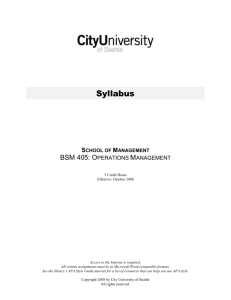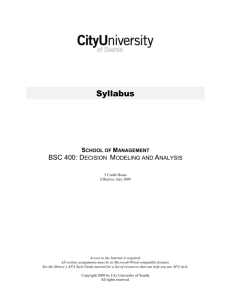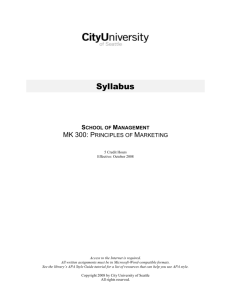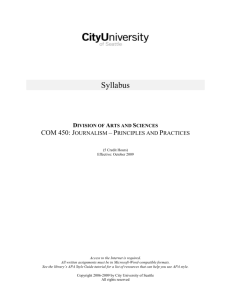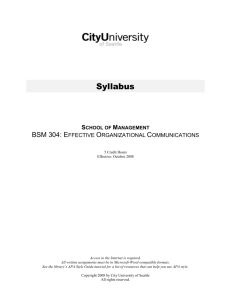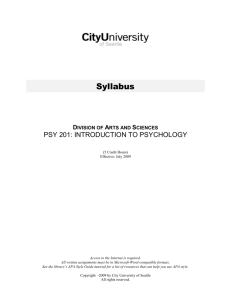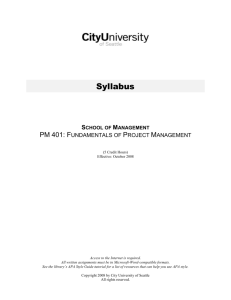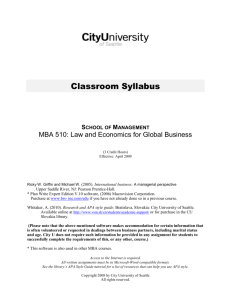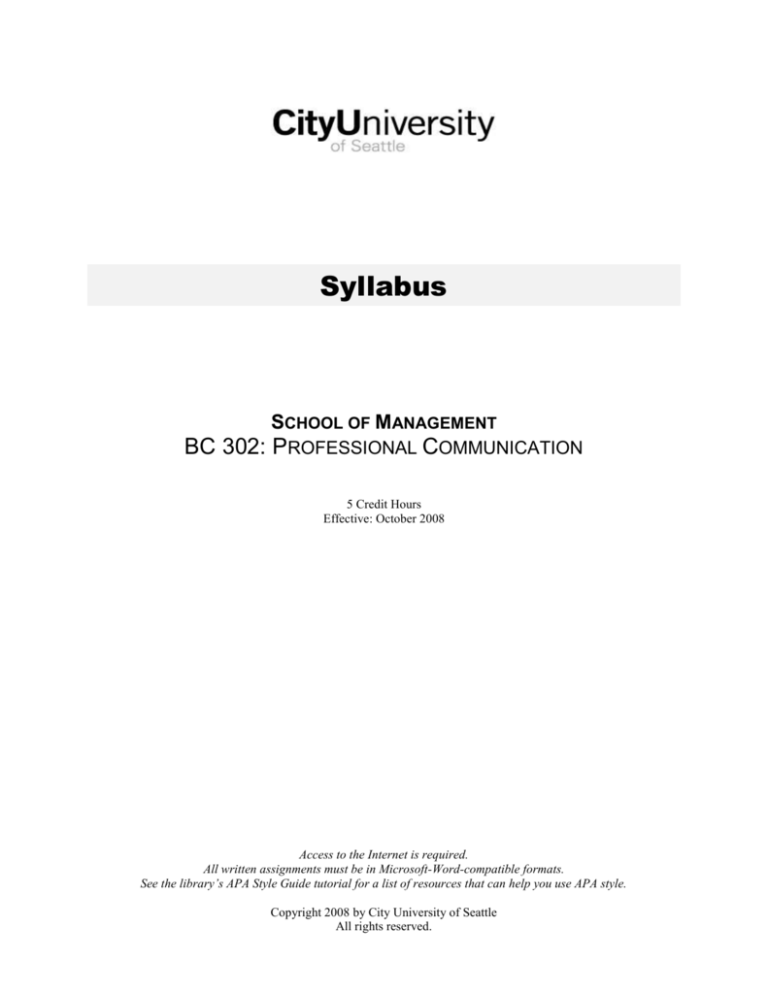
Syllabus
SCHOOL OF MANAGEMENT
BC 302: PROFESSIONAL COMMUNICATION
5 Credit Hours
Effective: October 2008
Access to the Internet is required.
All written assignments must be in Microsoft-Word-compatible formats.
See the library’s APA Style Guide tutorial for a list of resources that can help you use APA style.
Copyright 2008 by City University of Seattle
All rights reserved.
BC 302: PROFESSIONAL COMMUNICATION
FACULTY
Faculty Name:
Contact Information:
[Instructor may insert personal message if desired]
COURSE DESCRIPTION
This course focuses on the fundamentals of communication in the workplace. Students build professional
writing and speaking skills to inform, propose, and persuade. Students will also engage in analyzing a
case study, developing PowerPoint slides, making an oral presentation and writing e-mail messages,
announcements, memos, letters, and reports. Students will learn how to identify an issue, conduct
research, organize research findings, and present an argument. Additional topics include formatting
business documents and communicating with different audiences.
There are no prerequisites for this course.
COURSE RESOURCES
Required and recommended resources to complete coursework and assignments are listed on the
My.CityU portal at Library>Resources by Course.
CITYU LEARNING GOALS
The content of this course addresses the following CityU Learning Goals:
Strong Communication and Interpersonal Skills;
Critical Thinking;
Diverse and Global Perspectives;
Lifelong Learning.
PROGRAM CONTEXT
The content of this course aligns with the following program outcomes:
Recommend improvements that align with the company’s strategy, goals, and culture;
Integrate foundational knowledge of business functions;
Access and evaluate relevant information to guide business decisions;
Deliver powerful presentations and produce examples of effective business writing for diverse
audiences.
COURSE OUTCOMES
In this course, learners…
(BC 302)
Page 2
Eff: 10/08
Evaluate the importance of communication in the workplace;
Analyze factors that contribute to failure or success in professional writing;
Demonstrate professional writing skills;
Demonstrate the ability to write for different business audiences;
Assess current technologies used in the workplace;
Analyze a case study;
Plan and implement the stages of the research process;
Evaluate a variety of research sources;
Demonstrate the ability to support messages and arguments with relevant research sources;
Plan and deliver an effective oral presentation.
CORE CONCEPTS, KNOWLEDGE, AND SKILLS
Criteria for effective business communication;
Importance of effective communication in the workplace;
Grammar, spelling, punctuation, syntax, and style;
Writing selected business documents;
Writing for different business audiences;
Communication technologies;
Case study analysis;
Stages of research;
Library use and evaluation of sources;
Information literacy – online databases;
Oral presentation;
PowerPoint or other presentation tools.
OVERVIEW OF COURSE GRADING
The grade you receive for the course will be derived using City University of Seattle’s decimal grading
system, based on the following:
Overview of Required Assignments
Brainstorming Exercises
Written Quizzes
Business Writing Assignments
Resume and Cover/Job Application Letter
Research Report (Case Study Analysis), including journal and
outline
Oral Presentation with PowerPoint Slides and Notes
Instructor Determined Assignments (Including Discussion
Questions/Exercises as well as Participation)
TOTAL
% of Final Grade
5%
10%
15%
10%
30%
10%
20%
100%
(BC 302)
Page 3
Eff: 10/08
SPECIFICS OF COURSE ASSIGNMENTS
Brainstorming Exercises
Using the rules of brainstorming, you will work with other members of the class to evaluate the
importance of communication in the workplace, identify and apply criteria for effective business
communication, and determine guidelines for preparing and delivering effective oral and slide
presentations.
Written Quizzes
A written quiz is given in designated course sessions throughout the term. The quizzes test your
understanding of basic grammar, spelling, punctuation, syntax, style, criteria for effective business
communication, and current technologies used in the workplace.
Business Writing Assignments (E-Mail, Letter, and Memo)
In this course you will practice writing a variety of business documents. The three main ones are an email message, a letter, and a memo.
E-Mail Assignment
You will write an e-mail message to a problem-solving team that you are leading. In the message you will
present a summary of the problem you are tasked with solving and give two possible meeting dates and
times to discuss the problem. You will write as if you are a lead representative in the Customer Service
Department. Use the format shown in Figure A.13 on page 626 of the Locker/Kienzler text.
Letter Assignment
Complete assignment 11.19 on page 365 of the Locker/Kienzler text. Your letter will be one or two pages
in length. Use the block letter format presented on page 613 in Appendix A of the Locker/Kienzler text.
Memo Assignment
Complete assignment 12.19 on page 420 of the Locker/Kienzler text. The memo must be one to three
pages in length and must follow the format on page 623 in Appendix of the Locker/Kienzler text.
Resume
Use Figure 7.6 on pages 226-227 of the Locker/Kienzler text to prepare a current resume.
Job Application (Cover) Letter
Using either Figure 8.5 on page 250 or Figure 8.7 on page 252 of the Locker/Kienzler text, you will write
a job application (cover) letter to accompany your resume.
Research Report Journal
You will submit a Research Report Journal in which you keep a chronological record of your research
plan and its implementation along with information about each reference source that you investigate. The
(BC 302)
Page 4
Eff: 10/08
record should also contain detailed formatting information about each source that is selected so it may be
added to your reference list and used as a text citation/s in your document.
Research Report Outline
You will submit an outline of what you think will be your topic and thesis statement to be researched and
discussed in the research report. Provide a statement that introduces your topic, write the thesis statement,
and provide at least a general outline of the paper. The outline is due by the fifth week of the course, but
you may wish to submit it earlier in order to have more time to apply the instructor’s comments to
performing the research.
Research Report (Case Study Analysis)
Analyze either a hypothetical or real business organization (case study analysis) and write a research
report as if you were planning to submit it to the CEO or a high-level executive in your organization. The
purpose of the report is to persuade the executive to accept your recommended solution to a problem,
which you have identified through your analysis of the organization, from your research on the problem
and alternative solutions to it. You may choose from the following list of topics:
Communication technology
Conflict Management
Customer services
Intercultural communication
Managing work-related stress
Nonverbal communication
Operations
Public Relations
Supervisor-employee relationship
Telecommuting
Your textbook is also a good place to browse for topic ideas. Select an area that is of interest to you. Keep
in mind that broad topics will likely need to be narrowed or focused.
Examples:
●
Communication technology may be focused: electronic mail systems, instant messaging, visual
meetings, and others.
●
Conflict management may be focused: social conflict, negotiation, teams, problem solving,
decision making, emotional intelligence, corporate culture, and so forth.
●
Managing work-related stress may be focused: work environment, morale, work-life balance,
employee satisfaction, employee attitudes, turnover, and others.
When selecting, narrow the broad topic to fit the specific problem in your organization (e. g., low
employee morale, limited parking space, inappropriate nonverbal communication between employees,
supervisor-employee conflict, significant absenteeism, loss of customers to competitors, opening an
operation in another country, etc).
Your organization requires that reports include the following components in the sequence shown:
Memo of transmittal
Title page
Executive summary
Table of contents
List of illustrations or figures
Body of the report (10-12 pages)
Appendices (if any)
(BC 302)
Page 5
Eff: 10/08
Reference list
You will use at least six references in your paper, not including the textbook, of which three must be
professional or scholarly sources. The body of this paper will be ten to twelve pages in length. You must
keep your notes and rough drafts of your work, as your instructor may request them. In your paper you
will use APA style, citation, and reference format. For help locating references for the research paper,
refer to the BC 302 Course Resource Guide located in My.CityU Portal.
Oral Presentation with PowerPoint Slides and Notes
You will prepare an oral presentation on your research report that will be accompanied by a slide
presentation. The oral report must summarize the content of the research report and specify the
methodology and research sources utilized in its preparation. The PowerPoint presentation, which consists
of eight to thirteen slides, will summarize your research report. You will include the “notes” format when
you submit the presentation to your instructor. See chapter 6 and pages 494-495 of the Locker/Kienzler
text for additional information.
Instructor Determined Assignments
Whether in class, online, or in a mixed mode setting, students will be graded on their participation in
classroom discussions; their ability to present, explain, or defend alternative viewpoints; and the degree to
which they have mastered the concepts and principles inherent in the study of professional
communication. Written work will be assessed not only on relevance to the subject presented, but also on
adherence to good written form and professional presentation.
COURSE POLICIES
[Instructor inserts course policies here, based on school and/or program guidelines.]
Late Assignments
Students are expected to meet submission requirements for assignments in a timely manner. Evaluation
includes an assessment of timeliness. Late assignments jeopardize your learning, and may also for your
classmates.
A 1%, per each day late, penalty will be assessed for all late work. All assignments MUST be turned in no
later than the last night of the course.
[Instructor may insert his or her policy on late assignments if desired]
Participation
Students are expected to be actively engaged in a discussion or other activities. Active engagement means
contributing substantive, thoughtful and reflective responses. If online, students must post their initial
responses during the first three days of the week, and their responses to other students’ postings during
the last four days of the week.
Professional Writing
(BC 302)
Page 6
Eff: 10/08
All assignments for this course should be of professional quality. The writing should always take into
consideration the intended audience. Hand written work will not be accepted.
This course requires you to use the American Psychological Association (APA) style in preparing any
required research papers, or any written work where other sources are used. References should be cited
for all facts, ideas, conclusions, and opinions that are not your own.
A proper title page should preface all written assignments, unless otherwise stated. The title page should
include: your name, the title of the paper, the name and number of the course, your course start date, the
date submitted, and the name of the instructor.
Your work should be typed or word-processed on white 8 ½ by 11 inch paper. Any narrative sections
should be double-spaced. Some assignments may require that your work be prepared on a computer
spreadsheet.
UNIVERSITY POLICIES
You are responsible for understanding and adhering to all of City University of Seattle’s academic
policies. The most current versions of these policies can be found in the university catalog that is linked
from the CityU Web site.
Academic Integrity
Scholastic honesty in students requires the pursuit of scholarly activity that is free from fraud, deception
and unauthorized collaboration with other individuals. You are responsible for understanding CityU’s
policy on scholastic honesty and adhering to its standards in meeting all course requirements. A complete
copy of this policy can be found in the university catalog in the section titled Scholastic Honesty under
Student Rights & Responsibilities.
Attendance
Students are expected to attend both online and on-site each week. If a student is unable to attend either
the online and/or the on-site session, the student should notify the instructor prior to the session, or as
soon as possible after the session is missed. A missed class seriously hampers a student’s learning and
course participation. Make every effort to attend every session of the course.
SUPPORT SERVICES
Disability Resources
If you are a student with a disability and you require an accommodation, please contact the Disability
Resource Office as soon as possible. For additional information, please see the section in the university
catalog titled Students with Special Needs under Student Rights & Responsibilities.
Library Services
In order to help you succeed in this course, you have access to library services and resources 24 hours a
day, seven days a week. CityU librarians can help you formulate search strategies and locate materials
that are relevant to your coursework. For help, contact a CityU librarian through the Ask a Librarian
service. To find library resources, click on the Library link in the My.CityU portal.
(BC 302)
Page 7
Eff: 10/08
SmartThinking
As a CityU student, you have access to 10 free hours of online tutoring, including writing support, from
certified tutors 24 hours a day, seven days a week. Contact CityU’s Student Support Center at
info@cityu.edu to request your user name and password.
(BC 302)
Page 8
Eff: 10/08

